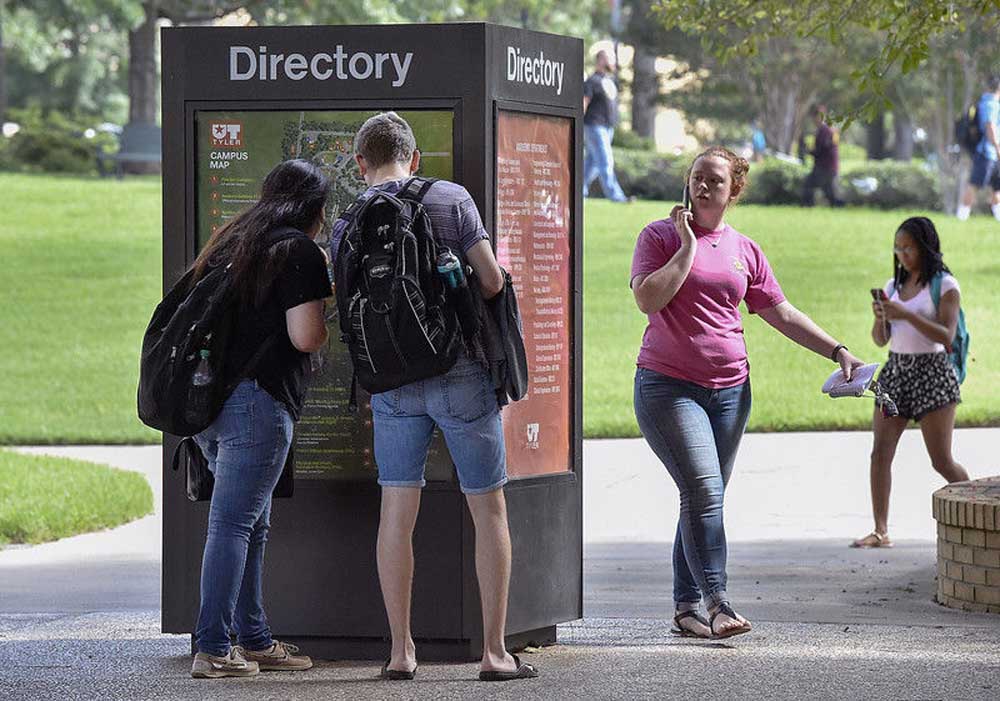BBB: Employment scams targeting college students
Published 5:15 am Tuesday, July 22, 2025

- Students study a campus map near the administration building in 2016, the first day of classes at University of Texas at Tyler. (Tyler Morning Telegraph File)
Many college students seek flexible, part-time employment to help cover school expenses. Finding a job can be challenging, and students may feel pressure to find work quickly. If this situation describes you or a student in your life, watch out for scams. BBB Scam Tracker has gotten reports of employment scams impersonating professors and university departments.
How job scams work
It often starts with an email that seems routine: a message in your school inbox promoting a job that fits perfectly around a student’s schedule. It might reference your university’s job board or come from someone posing as a professor or student services. The job sounds simple and appealing—remote work, flexible hours, and quick pay.
But once a student responds, the situation quickly takes a turn. There’s no interview. No real explanation of the role. A check arrives unexpectedly in the mail, with instructions to deposit it and use part of the money to buy gift cards, send funds to someone else, or purchase “job supplies.” The rest is yours to keep—as long as you follow the directions exactly.
Trending
Although the check isn’t real, it looks real enough for the banks initially accept it. By the time the fraud is uncovered—sometimes days, even weeks later—the student has already sent off their own money or transferred it to someone else. At that point, it’s gone. And worse, the scammers often have access to personal documents shared during the so-called hiring process: Social Security cards, driver’s licenses, even banking details.
This type of scam has hit campuses across the country, and not every student is lucky enough to catch it in time. Some realize it only after their accounts are overdrawn or their identity has been compromised.
“Scammers are getting smarter—and now they’re targeting college students by sending what appear to be legitimate job offers from trusted school sources,” said Mechele Agbayani Mills, president and CEO of BBB Central East Texas. “These fake opportunities often lead to financial loss, identity theft, and a lot of stress for students who are just trying to earn some extra money.”
BBB provides the following tips for job seekers:
Do your research. Before you say yes to any job, research the company that wants to hire you. Does the company have a professional website and legitimate contact information? Search for what others are saying about their experience with this company. Do an internet search with the employer’s name and the word “scam” to see if there are reports involving job scams.
Beware of red flags. Scammers often send emails with many typos and grammatical errors. They offer to hire you without an interview and even pay you before you’ve done any work. None of these are behaviors of a reputable business.
Trending
Examine the email address of those offering jobs to see if it matches the domain used by an actual company. Be alert to Gmail business email addresses.
Never send money to strangers. Never send funds in cash, checks, gift cards or wire transfers to someone you don’t know or haven’t met. No legitimate company will ask you to pay them to get a job.
Be very wary of some positions. Some types of jobs are more likely to be scams, such as mystery shopping or secret shopper positions or work-from-home jobs that involve receiving and reshipping packages
For more information
To learn more about how to avoid employment scams, see BBB.org/EmploymentScam. You can also find valuable information at BBB.org/AvoidScams.
If you’ve been the victim of an employment scam, report it on BBB.org/ScamTracker. Your experience can help others to recognize suspicious behavior and stop scammers in their tracks.
— BBB is a nonprofit, business-supported organization that sets and upholds high standards for fair and honest business behavior. Most BBB services to consumers are free of charge. BBB provides objective advice, free BBB Business Profiles on more than 5.3 million companies, 11,000 charity reviews, dispute resolution services, alerts and educational information on topics affecting marketplace trust. Visit bbb.org for more information. BBB Serving Central East Texas was founded in 1985 and serves 19 counties.





